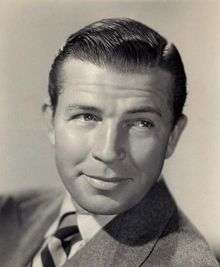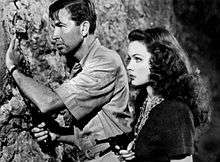Bruce Cabot
| Bruce Cabot | |
|---|---|
 Bruce Cabot in Sinners in Paradise (1938) | |
| Born |
Etienne Pelissier Jacques de Bujac April 20, 1904 Carlsbad, New Mexico, United States |
| Died |
May 3, 1972 (aged 68) Woodland Hills, California, United States |
| Occupation | Actor |
| Years active | 1931–71 |
| Spouse(s) |
Gracy Mary Mather Smith (m. 1926; div. 1930) Francesca De Scaffa (m. 1950; div. 1957) |
Bruce Cabot (born Étienne de Pelissier Bujac Jr., April 20, 1904 – May 3, 1972) was an American film actor, best remembered as Jack Driscoll in King Kong (1933) and for his roles in films such as The Last of the Mohicans (1936), Fritz Lang's Fury (1936) and the western Dodge City (1939). He was also known as one of "Wayne's Regulars", appearing in a number of John Wayne films beginning with Angel and the Badman (1947).
Early life
Cabot was born in Carlsbad, New Mexico to a prominent local lawyer, Major Étienne de Pelissier Bujac, Sr. and Julia Armandine Graves, who died shortly after giving birth to her son. Étienne, Sr., was the son of John James Bujac, a lawyer and mining expert in Baltimore, Maryland. Étienne, Sr., graduated from Cumberland School of Law near Nashville, Tennessee, and served in the United States army during the Spanish–American War and the Philippine–American War before settling in Carlsbad.[1][2]
Cabot graduated from Sewanee Military Academy in 1921 and briefly attended the University of the South in Sewanee, Tennessee, but left without graduating.[3] He worked at many jobs, including as a sailor, an insurance salesman, oil worker, surveyor, and prize fighter; he also sold cars, handled real estate, and worked at a slaughterhouse. A meeting with David O. Selznick at a Hollywood party started his acting career.
Acting career
Cabot appeared in nearly one hundred feature films. He made his debut in 1931 in an uncredited bit part in an episode of the serial Heroes of the Flames. In Ann Vickers (1933), he portrays a soldier who seduces a naive woman (Irene Dunne) and gets her pregnant as he leaves for the war. He then appeared in King Kong (1933), which became an enormous success and established Cabot as a star.
He also played villains, appearing as a gangster boss in Let 'Em Have It (1935) and as the Huron warrior Magua opposite Randolph Scott in The Last of the Mohicans (1936). He starred with Spencer Tracy, playing the leader of a lynch mob in Fritz Lang's first Hollywood film, Fury (1936), and with Errol Flynn in Michael Curtiz's epic western Dodge City (1939), which became one of Warner Bros.'s biggest hits.
He tested for the lead role of The Ringo Kid in John Ford's Stagecoach (1939), but John Wayne got the part.[4] A consistent box office draw, Cabot appeared in many movies at many studios before leaving Hollywood to serve in World War II.
World War II
Cabot enlisted in December 1942 and, after Officer Training School in Miami Beach, became a first lieutenant in the U.S. Army Air Force.
Return to Hollywood
Cabot headed back to Hollywood and fell in with John Wayne (whose career was then in the ascendant, and who would become a major force in American film-making over the next two decades) on the set of Angel and the Badman (1947) and became part of Wayne's circle, this relationship paying off in the 1960s when Wayne cast him in ten of his films: The Comancheros (1961), Hatari! (1962), McLintock! (1963), In Harm's Way (1965), The War Wagon (1967), The Green Berets (1968), Hellfighters (1968), The Undefeated (1969), Chisum (1970), and Big Jake (1971).
Cabot's final screen appearance was in the 1971 James Bond film Diamonds Are Forever.
He was inducted into the New Mexico Entertainment Hall of Fame in 2012.
Television
Bruce Cabot starred in a number of the Tales of Tomorrow episodes (1952–53), television's first sci-fi drama and an early hit for ABC.
He also appeared on other television series such as:
- Burke's Law - "Who Killed Holly Howard?" - Thomas Matherson (1963)
- Bonanza! - "A Dime's Worth of Glory" - Sheriff Reed Carrimore (1964)
- Daniel Boone - "The Devil's Four" - Simon Bullard (1965)
Personal life
Cabot was married three times, in Florida to Mary Mather Smith with whom he divorced prior to moving to Hollywood, and to actresses Adrienne Ames and Francesca De Scaffa.
He was one of Errol Flynn's social pack for several years but they fell out during the production of the unfinished The Story of William Tell. Flynn was producing the film and asked Cabot, whom he described as "an old, old pal," to perform in it, knowing that Cabot was finding it hard to get work in Hollywood at that time. However, when Flynn's production partners defaulted, the production halted, leaving Flynn stranded in Rome facing financial ruin. Cabot, in an attempt to get paid when other cast members were working without pay, had Flynn's and his wife Patrice Wymore's personal cars and clothing in their Rome hotel seized. Flynn wrote angrily in his autobiography of what he termed Cabot's "betrayal."[5] Eleven years after Flynn's death, in an interview in England in 1970, Cabot paid tribute to him as a critically underestimated actor, but said that Flynn had destroyed himself through narcotic addiction.
Death
Cabot died in 1972 at the Motion Picture Country Home at Woodland Hills, California from lung cancer[6] and was buried in his hometown of Carlsbad, New Mexico.
Filmography

.jpg)

- Heroes of the Flames (1931) as Bit Part [ch.7] (uncredited)
- Confessions of a Co-Ed (1931) as Student at Dance (uncredited)
- Lady with a Past (1932) as Party Guest (uncredited)
- The Roadhouse Murder (1932) as Fred Dykes
- The Lost Special (1932) as Forest Ranger (uncredited)
- Lucky Devils (1933) as Happy White
- The Great Jasper (1933) as Roger McGowd (adult)
- King Kong (1933) as Jack Driscoll
- Scarlet River (1933) as Bruce Cabot (uncredited)
- Disgraced! (1933) as Kirk Undwood, Jr.
- Flying Devils (1933) as 'Ace' Murray
- Midshipman Jack (1933) as Jack Austin
- Ann Vickers (1933) as Capt. Lafayette Resnick
- Shadows of Sing Sing (1933) as Bob Martel
- Finishing School (1934) as Ralph McFarland - intern
- Murder on the Blackboard (1934) as Addison 'Ad' Stevens
- Let's Try Again (1934) (scenes deleted)
- His Greatest Gamble (1934) as Stephen
- Their Big Moment (1934) as Lane Franklyn
- Redhead (1934) as Ted Brown
- Men of the Night (1934) as Det. Sgt. 'Stake-Out' Kelly
- Night Alarm (1934) as Hal Ashby
- Without Children (1935) as Davd F. Cole
- Let 'Em Have It (1935) as Joe Keefer
- Show Them No Mercy! (1935) as Pitch
- Don't Gamble with Love (1936) as Jerry Edwards
- The Robin Hood of El Dorado (1936) as Bill Warren
- The Three Wise Guys (1936) as Blackie
- Fury (1936) as Kirby Dawson
- The Last of the Mohicans (1936) as Magua
- Don't Turn 'Em Loose (1936) as Robert Webster - Alias Bat Williams
- The Big Game (1936) as Cal Calhoun
- Legion of Terror (1936) as Frank Marshall
- Sinner Take All (1936) as Ernie
- Bad Guys (1937) as 'Lucky' Walden
- Love Takes Flight (1937) as Neil 'Brad' Bradshaw
- The Bad Man of Brimstone (1937) as 'Blackjack' McCreedy
- Sinners in Paradise (1938) as Robert Malone
- Smashing the Rackets (1938) as Steve Lawrence
- Tenth Avenue Kid (1938) as Jim 'Silk' Loomis
- Homicide Bureau (1939) (lead with Rita Hayworth) as Jim Logan
- Mystery of the White Room (1939) as Dr. Bob Clayton
- Dodge City (1939) as Jeff Surrett
- Mickey the Kid (1939) as Jim Larch / Jim Adams
- Traitor Spy (1939) as Carl Beyersdorf / Ted Healey
- My Son Is Guilty (1939) as Ritzy Kerry
- Susan and God (1940) as Michael
- Captain Caution (1940) as Slade
- Girls Under 21 (1940) as Smiley Ryan
- The Flame of New Orleans (1941) as Robert LaTour
- Sundown (1941) as William Crawford
- Wild Bill Hickok Rides (1942) as Wild Bill Hickok
- Pierre of the Plains (1942) as 'Jap' Durkin
- Silver Queen (1942) as Gerald Forsythe
- The Desert Song (1943) as Colonel Fontaine
- Salty O'Rourke (1945) as Doc Baxter
- Divorce (1945) as Bob Phillips
- Fallen Angel (1945) as Dave Atkins
- Smoky (1946) as Frank Denton
- Avalanche (1946) as Steve Batchellor
- Angel and the Badman (1947) as Laredo Stevens
- The Gunfighters (1947) as Bard Macks
- The Gallant Legion (1948) as Beau Laroux
- Sorrowful Jones (1949) as Big Steve Holloway
- Rock Island Trail (1950) as Kirby Morrow
- Fancy Pants (1950) as Cart Belknap
- Best of the Badmen (1951) as Cole Younger
- Kid Monk Baroni (1952) as Mr. Hellman
- Lost in Alaska (1952) as Jake Stillman
- The Red Cloak (1955) as Capitano Raniero d'Anversa
- Rommel's Treasure (1955) as Welles
- Totò, lascia o raddoppia? (1956) as Nick Molise
- The Quiet American (1958) as Bill Granger
- The Love Specialist (La ragazza del palio) (1958) as Mike
- The Sheriff of Fractured Jaw (1958) as Jack
- Guardatele ma non toccatele (1959) as Collonnello Joe Charleston
- John Paul Jones (1959) as Gunner Lowrie
- Goliath and the Barbarians (Il terrore dei barbari) (1959) as Alboino
- The Comancheros (1961) as Maj. Henry
- Hatari! (1962) as Little Wolf aka The Indian
- McLintock! (1963) as Ben Sage
- Law of the Lawless (1964) as Joe Rile
- In Harm's Way (1965) as Quartermaster Quoddy
- Black Spurs (1965) as Bill Henderson
- Cat Ballou (1965) as Sheriff Maledon
- Town Tamer (1965) as Riley Condor
- Choque de Sentimentos (1965)
- The Chase (1966) as Sol
- The War Wagon (1967) as Franklin Pierce
- The Green Berets (1968) as Colonel Morgan
- Hellfighters (1968) as Joe Horn
- The Undefeated (1969) as Jeff Newby
- Chisum (1970) as Sheriff Brady
- WUSA (1970) as King Wolyoe
- Big Jake (1971) as Sam Sharpnose
- Diamonds Are Forever (1971) as Bert Saxby (final film role)
References
- ↑ Twitchell, Ralph Emerson (1917). The Leading Facts of New Mexican History, Vol. III. Cedar Rapids, Iowa: The Torch Press. pp. 235–236. Retrieved 21 May 2017.
- ↑ Birchell, Donna Blake (2015). Legendary Locals of Carlsbad, New Mexico. Charleston, South Carolina: Arcadia Publishing. p. 73. Retrieved 21 May 2017.
- ↑ "Bruce Cabot, Actor, Is Alumnus" (PDF). Sewanee Alumni News (Vol. VII, No. IV, p. 4). Associated Alumni of the University of the South. August 1941. Retrieved 21 May 2017.
- ↑ True West Magazine
- ↑ Flynn, Errol (1959). My Wicked, Wicked Ways. Dell. pp. 10&ndash, 11, 362.
- ↑ Bruce Cabot, Film Actor, Dies; Played the Hero in King Kong, New York Times, May 4, 1972; retrieved Oct. 9, 2017
External links
| Wikimedia Commons has media related to Bruce Cabot. |